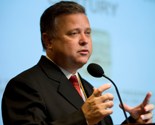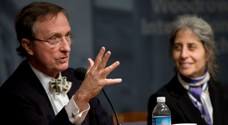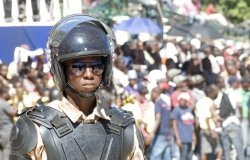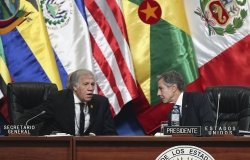Agribusiness and Sustainability in Brazil
Blairo Maggi, Governor of Mato Grosso; Ricardo Arioli, President, Mato Grosso Association of Soybean Producers (Aprosoja); Rui Prado, President, Mato Grosso Farm Bureau (FAMATO); John Carter, Director, Aliança da Terra; Annie Petsonk, International Counsel, Environment Defense Fund's Climate & Air Program; Thomas Lovejoy, Biodiversity Chair, Heinz Center; Mark London, Lawyer at London & Mead and author of The Last Forest
Overview

 The issues of global climate change, environmental preservation and food security have emerged as dominant themes on the international agenda. Nowhere is the convergence of these issues more apparent than in Brazil—a major food supplier and owner of more than 65 percent of the Amazon rain forest—and, especially, in the state of Mato Grosso. As Brazil's leading producer of various foodstuffs (it supplies 8 percent of the world's soya) with its northern border along the "frontier" of the Amazon, Mato Grosso is at the center of the broader debate about economic development and environmental sustainability.
The issues of global climate change, environmental preservation and food security have emerged as dominant themes on the international agenda. Nowhere is the convergence of these issues more apparent than in Brazil—a major food supplier and owner of more than 65 percent of the Amazon rain forest—and, especially, in the state of Mato Grosso. As Brazil's leading producer of various foodstuffs (it supplies 8 percent of the world's soya) with its northern border along the "frontier" of the Amazon, Mato Grosso is at the center of the broader debate about economic development and environmental sustainability.
 To advance dialogue and promote effective policy that addresses these interlinked issues, the Brazil Institute convened a seminar focused on "Agriculture and Sustainability" with the principal stakeholders. The governor of Mato Grosso, Blairo Maggi, and agricultural sector representatives, researchers, business leaders from the state were joined by prominent international environmentalists. The debate centered on increasing the value of forested regions, emphasizing the need for carbon markets; the detrimental climate impact of agriculture protectionism in advanced countries; monitoring and tracking of deforestation; the productivity of Brazilian agriculture and prospects for greater technological advances; improving infrastructure, stability of land tenure and questions of more effective governance; and the important role of the "Amazon rain machine" in the hydrologic cycle of agriculture in Brazil.
To advance dialogue and promote effective policy that addresses these interlinked issues, the Brazil Institute convened a seminar focused on "Agriculture and Sustainability" with the principal stakeholders. The governor of Mato Grosso, Blairo Maggi, and agricultural sector representatives, researchers, business leaders from the state were joined by prominent international environmentalists. The debate centered on increasing the value of forested regions, emphasizing the need for carbon markets; the detrimental climate impact of agriculture protectionism in advanced countries; monitoring and tracking of deforestation; the productivity of Brazilian agriculture and prospects for greater technological advances; improving infrastructure, stability of land tenure and questions of more effective governance; and the important role of the "Amazon rain machine" in the hydrologic cycle of agriculture in Brazil.
Hosted By

Brazil Institute
The Brazil Institute—the only country-specific policy institution focused on Brazil in Washington—works to foster understanding of Brazil’s complex reality and to support more consequential relations between Brazilian and US institutions in all sectors. The Brazil Institute plays this role by producing independent research and programs that bridge the gap between scholarship and policy, and by serving as a crossroads for leading policymakers, scholars and private sector representatives who are committed to addressing Brazil’s challenges and opportunities. Read more

Latin America Program
The Wilson Center’s prestigious Latin America Program provides non-partisan expertise to a broad community of decision makers in the United States and Latin America on critical policy issues facing the Hemisphere. The Program provides insightful and actionable research for policymakers, private sector leaders, journalists, and public intellectuals in the United States and Latin America. To bridge the gap between scholarship and policy action, it fosters new inquiry, sponsors high-level public and private meetings among multiple stakeholders, and explores policy options to improve outcomes for citizens throughout the Americas. Drawing on the Wilson Center’s strength as the nation’s key non-partisan policy forum, the Program serves as a trusted source of analysis and a vital point of contact between the worlds of scholarship and action. Read more
Thank you for your interest in this event. Please send any feedback or questions to our Events staff.










